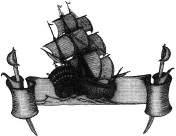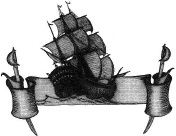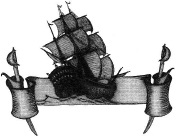Peter and the Shadow Thieves (28 page)
Read Peter and the Shadow Thieves Online
Authors: Dave Barry,Ridley Pearson
Tags: #Juvenile Fiction, #General, #Action & Adventure
Whichever it was, Peter was in serious trouble.

GRASPING HANDS
T
HE STARSTUFF WAS wearing off. The other prisoners hadn’t felt this yet: they were stil giggling with glee, cavorting and spinning in midair, the chain transmitting the motion from one to the other so that they were al whirling and spinning madly in the sky. The drunks who’d been at the rear of the prisoner line were singing a song about whiskey in the jar. Some distance away, Humdrake was now floating horizontal y, his face to the sky, smiling beatifical y and waving his arms, doing a lazy backstroke to nowhere.
But Peter knew it was wearing off, and they were starting, ever so slowly, to descend. For the tenth time, he lunged and strained against the chain, trying to fly the mass of prisoners over to Humdrake and the shiny brass shackle key on his key ring, which dangled tantalizingly from a hook on his belt. And for the tenth time, he was unable to move the mass at al .
Unlike Peter’s euphoric fel ow prisoners, the crowd below had noticed that the group was beginning to come down. A contingent of police officers had gathered and, with much shouting and shoving, begun to clear out the space where it appeared the group would be landing. The bobbies did not know how these prisoners had managed to flee skyward—the word “witchcraft” was already being whispered in the crowd—but they clearly intended to take them back into custody when they returned to earth.
Slowly, slowly the prisoners descended toward the waiting bobbies, whose arms were outstretched in readiness. Peter gauged the distance: fifty feet to the bobbies’ hands, now forty, now thirty, now twenty, ten…
Bel s.
Peter spun around, looking for the source of the sound, his eye catching a blazing blur of light coming over the courthouse roof, angling downward and streaking directly toward him until, with impossible deceleration, it stopped short six inches from his face and turned into…
“Tink!” Peter cried.
You
smell terrible,
she said, wrinkling her nose.
“I know,” he said. “Could you—”
Who are these filthy boys
?
“We’re prisoners,” he said. “I need—”
Why did you open your locket
?
Peter looked down and saw a policeman’s grasping hand just five feet from his toes.
“Please, Tink, I’l explain later,” he said. “Go get the keys from that man.” He pointed toward Humdrake backstroking happily a few yards away, just above the outstretched arms of two bobbies. Tink, after giving Peter a what-would-you-do-without-me look, zipped over, grabbed the keys from Humdrake’s belt, avoided the swiping hand of a leaping bobby, and zipped back to Peter.
Peter’s cluster was almost down now; the bobbies had managed to snag the feet of the last drunk in line, and were starting to reel in the entire group. Peter grabbed the key ring from Tink and fumbled frantical y through the keys, final y getting the shiny brass one. He bent over and inserted it into the hole in the shackle.
“Get that one!” shouted a deep voice just below him. “He’s got a key!”
Peter felt a hand grab his left leg; he kicked it free. He turned the key, and the shackle on his right ankle opened. Another hand grabbed at him, then another. Strong hands.
Peter kicked with al his strength, heard a loud “Ow!” and a curse below him, and then shot upward, away from the chain and the shackles, away from the grasping hands, away from the shouting crowd and the chaos beneath him.
He soared into the darkening sky with Tink at his side, free again, leaving the other prisoners—stil obliviously euphoric—to settle slowly into the arms of the London law, captive once again, but now in possession of a story that they would be tel ing until they drew their last breaths on earth.

THE MESSAGE FROM EGYPT
M
OLLY AND HER MOTHER were talking quietly in the sitting room. It was the first moment they’d been able to find alone together since breakfast. Throughout the morning, each time one had approached the other, it seemed that Jenna had been lurking about. Final y, Louise Aster had ordered Jenna to leave the house on a trivial errand—an order that Jenna had obeyed with obvious reluctance.
Mol y and her mother sat on the sofa, their heads close together, their voices low. They discussed the suspicious actions of Jenna, and the disturbing change in the behavior of Mr. Jarvis and Mr. Cadigan, as wel as Hornblower’s reaction. Mol y, relieved to be talking about these things at last, told her mother about the unusual warmth she’d felt—twice—from her locket, and the unfamiliar policeman who’d been passing by at odd hours, and the strange man who had suddenly appeared out of the darkness when the bobby was talking to Mr.
Jarvis.
“What do you mean, strange?” asked her mother.
“Wel ,” said Mol y, trying to remember what she’d seen in those fleeting seconds, “he was very dark.”
“You mean, he was wearing dark clothing?”
“Yes, I suppose he was,” said Mol y. “But it was more than that. He…his whole form was the blackest of blacks, as if he were part of the night itself.”
“What did he look like?”
“I couldn’t see his face. He was just a black
shape,
and the way he moved, it was—” Mol y hesitated.
“What?” said Louise.
“It was the strangest thing. He moved quickly, and yet so
easily,
as if there were no effort. It wasn’t like a person running at al ; it was like ink flowing.”
“Did Mister Jarvis see him?”
“No. He was looking the other way. The bobby saw him—he had to have; he was looking right at him—but he didn’t react. And the dark man was gone a moment later. It happened in an instant.”
“What happened?”
“I’ve been thinking and thinking about that, trying to picture it,” said Mol y, frowning. “It was so quick, and there wasn’t much light. But whatever it was, Mister Jarvis
looked
different afterward. I can’t explain it very wel , I’m afraid. But it was as if something that should have been there wasn’t. He’d changed somehow. I’m not making sense, am I?” Louise didn’t answer, but her face fil ed with worry.
“What is it, Mother?” Mol y asked. “Do you know who the dark man was?”
“No,” said Louise. “Not real y.”
“But you know
something,
” Mol y said. “Tel me, please!”
“I can’t say for certain,” said Louise slowly. “I don’t know if there’s a connection…but just before your father left, he received word from Egypt, from one of our people there, an old friend of your father’s named Bakari. He sent a brief message, apparently written in great haste.”
“What did it say?”
“Some starstuff fel ,” said Louise. “A smal amount. Our people detected it immediately and sent a group of six to retrieve it. They were transporting it to Cairo when something went terribly wrong. There was an ambush; somehow the Others knew exactly where they were. Bakari was the only one of the six who managed to escape.”
“That’s awful,” said Mol y, “but what does it have to do with what happened here last night?”
“Bakari said that they were betrayed.”
“By whom?”
Louise put her hand on Mol y’s. “By one of us,” she said. “By a Starcatcher.”
Mol y’s eyes widened. “But that’s impossible,” she said.
Louise nodded. “So we thought as wel . But Bakari’s message was quite definite.”
Mol y frowned. “But I stil don’t understand what it has to do with—”
She was stopped by the tightening of Louise’s grip.
“Bakari’s message ended with a strange warning,” said Louise. “Neither your father nor I understood it at the time.”
“What was it?” said Mol y.
Her mother looked out the window, then back at Mol y.
“The warning,” she said, “was ‘Beware the shadows.’”

THE LETTER
W
HEN PETER FELT HE HAD flown a safe distance from the chaos on the courthouse steps, he landed on a rooftop amid a clutter of rundown homes. After looking around to make sure nobody was watching, he dropped to the ground in an al ey. Tink, fol owing him, landed on his shoulder.
You smell terrible,
she reminded him, in case he had forgotten.
“I know,” he said. “I was in a jail. It was…pretty awful. How did you get out of that cage?”
The canaries helped
me, she said.
They’re not too bright, but they’re brave, once you tell them what to do.
Peter smiled despite the sour smel of his clothes, the penetrating cold, and the gnawing emptiness in his bel y. “Wel ,” he said, “I’m very glad you got out. You saved me, Tink.
Again. Thank you.”
You’re welcome,
said Tink, literal y aglow with pride, fil ing the dark and filthy al ey with warm, golden light.
“Now we need to find Mol y,” said Peter.
Instantly the al ey went dark.
“What’s the matter?” said Peter.
Tink made a sound that cannot be translated into acceptable English.
Peter blushed. “Tink!”
Why do we have
to
find her
?
“Because,” said Peter, “she’s my friend, and she’s in danger.”
You’ve had nothing but trouble since you started looking for her.
“She’d do the same for me.”
You don’t know that.
“I do know that. When we were on the ship, she—”
Peter was interrupted by another unprintable burst of bel s. Tink hated—
hated
—to be reminded that Peter and Mol y had known each other before Tink existed, at least in her current form.
“Wel , you can say what you want,” said Peter, when she was quiet again, “but I’m going to look for her.” He walked resolutely out of the al ey. After a moment of fuming, Tink fol owed him, as he knew she would. When she landed on his shoulder, he gently caught her in his hand and tucked her under his shirt, an action that resulted in a predictable outpouring of complaints about his aroma.
“I’m sorry,” he said. “But you saw what happens when people see you. I’l get clean clothes as soon as I can.” He tried to sound confident, but he wondered how he would find clean clothes when he’d been such a miserable failure at finding Mol y’s house. He wandered the busy streets aimlessly for close to an hour without any workable plan presenting itself. He was walking numbly, head down, slowly being overcome by the now-familiar feeling of hopelessness, when he literal y bumped into the solution to his problem.
“Here now!” said a gruff voice.
Peter, bouncing back from the col ision, found himself looking up at a tal man in a bright red coat, with a sack slung over his shoulder.
A postman.
“Sorry!” said Peter.
“Mind where you’re going!” barked the postman, striding off briskly.
Peter turned and fol owed, a few paces back, formulating a plan while half trotting to keep up with the postman’s lengthy stride. Peter had never sent a letter, nor received one.
But in his years at St. Norbert’s Home for Wayward Boys, several of his friends had received letters, and as Peter hurried along behind the postman, he tried to remember precisely how they worked. He knew you had to write the person’s name on the envelope. But would that be enough?
Peter didn’t know Mol y’s address; al he knew was that she lived in London.